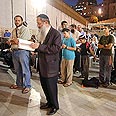
Traditionally, the 17th of Tammuz commemorates the day the Romans breached the wall of Jerusalem on their way to destroying the temple three weeks later. Our sages – and despite attempts by observant Jews to claim sole ownership of Jewish sources and secular willingness to forego a connection with traditional Jewish learning, they are very much OUR sages – linked the destruction and suffering of the next three weeks to a phenomenon known in Hebrew as "sinat hinam" – free hatred.
Fasting: A Jewish value
The Talmud says fasting is a traditional, appropriate response to suffering and bad luck. We are not monks; we do not reject the physical world. The Torah holds no high regard for people who undertake torturous physical trials in persuit of some spiritual goal. We are commanded to be part of this world, to enjoy the fruits of it and to strive to be a light unto the nations in this world.
But occasional fasts help keep this in perspective. Used properly, fast days are a time for introspection and soul searching. They are an opportunity to consider our mortality and to re-evaluate our lives, and to focus on things that are truly important.
For this reason, the sages taught that fasting is an appropriate response for a community that finds itself in threatening, troubling times. This would appear to be the case today.
Different meaning for everyone
To religious Jews, fasting is supposed to encourage humility and piety. For one day every few months, pangs of hunger are meant to drive each individual to a renewed knowledge that all sustenance comes from God. But what has that got to do with non-observant or even atheist, Israelis?
A lot. Fasting could be an act of national solidarity with Gilad Shalit. And with Noam and Aviva Shalit, Gilad's parents, who haven't seen or heard from their son in more than two weeks. And with the Banin and Turgeman families, who will bury their children today. And with their children, and with other soldiers who have been killed or kidnapped this month.
Perhaps fasting together could remind us that we are one nation, and that like it or not, we are all in this together. Like the siren on Memorial Day, a national fast day could create a sense of cross-sector solidarity, but unlike the siren, it would include everyone and be based on traditional Jewish teaching.
Where the hell are the rabbis?
Which brings us to the main question: Where the hell are the rabbis today? Once again, our so-called spiritual "leaders" have failed miserably, and missed a golden opportunity to draw people closer to Torah, and to present an ancient Jewish custom as relevant and meaningful for today.
The Mishna (Taanit 15a) describes a fast day at the time of the second temple: "The Holy Ark would be taken out to the city square, and people would wear sackcloth and put ash on their heads, and the town elders would implore them to repent." But why haven't the chief rabbis, and all living ex-chief rabbis called for national fasting rallies for this afternoon in Rabin Square, along the Tel Aviv beachfront and Jerusalem's Zion Square?
No one exempt
What's more, nobody in Israel today should consider themselves exempt from today's fast. It is clear (to me, at least) that the sort of free hatred that characterized that ancient period of time is in abundance today. Left-wing activists celebrated the destruction of 10,000 Jewish lives in Gush Katif last year, and continue to smugly wave scorn at their ongoing plight, while right-wing settlers couldn't care less about the moral reservations many Israelis feel about serving in Judea and Samaria.
In Jerusalem, homosexual activists continue to insist on holding their parade next month despite pleas by religious groups not to ignite the tinderbox city, and anti-gay haredim (ultra-Orthodox) have gone so far as to offer a bounty for each homosexual killed during the march. Archetypical "north Tel Avivians" don't like the haredim because they aren't Zionists, and they don't like religious Zionists because they are too Zionistic, and both of those groups in turn can't stand the "Hebrew-speaking goyim" from north Tel Aviv. And the list goes on and on.
A national fast
There could hardly be a better time to push for a truly national fast day that the present, and as in all areas of Torah, there is something about 17th Tammuz for everyone. But instead of appealing to religious and non-religious populations to observe this obscure fast, our rabbis have chosen to wash their collective hands of secular Israel, instead of presenting Jewish tradition in a modern, accessible light.
In doing so, they have let the country – particularly the secular population – down. Again.
Andrew Friedman is opinion editor of Ynetnews















